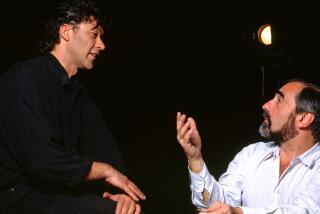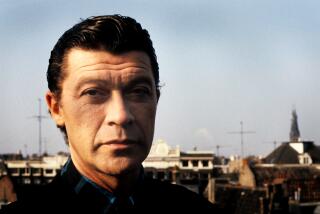Book review: ‘The Wrecking Light’ by Robin Robertson
- Share via
Robin Robertson is caught between worlds — between the contemporary London in which he lives and an epic past evoked by longboats and bonfires and where myths, not science, explain the workings of the world. His 2006 collection “Swithering” actively moved between both just as that interesting word — a Scottish one referring not only to agitation but also to vacillation and movement — clearly announced on the book’s cover.
And in his new collection, “The Wrecking Light” (Mariner Books: 97 pp., $13.95 paper), that tendency to swither remains as the poet moves between homages to Ovid, Neruda, Baudelaire and other great figures of the past and moody glimpses of himself and the modern world (“How long ago,” he asks in “Easter, Liguria,” “did I notice that the light was wrong,/ that something inside me was broken?”)
One of the collection’s centerpieces is “Leaving St. Kilda,” an extraordinary poem, written in that full-blown rhetoric of epic adventure that you might find in a translation of “The Odyssey” or “The Iliad” about a pitiful little island beyond the Outer Hebrides — a place so tiny it barely merits a mark on most atlases of the world. Small as it is, however, Robertson invests its entire landscape, the place names and landmark names, with a magic that’s clearly in the spirit of Tolkien (or, for that matter, George R.R. Martin).
Clouds stream over the edge of Mullach Mòr, pouring
into the valley as we sail against the sun from Village Bay,
rounding the Point, and the Point of the Water,
north under Oiseval and the Hill of the Wind, and round
past the Skerry of the Cormorants…
There’s a drama and majesty here that also teaches us a lesson: That a writer, a poet especially, has the power to make an act of recovery. In “Leaving St. Kilda” Robertson recalls all those unique, old names (and who, by the way, first named them?) before they’re lost — before the clouds stream over them, as they do over Mullach Mòr, and they’re forgotten. Elsewhere in this somber, beautiful collection, Robertson does the same with smaller, fleeting moments of insight as his speakers confront the passing of time — how, for instance, in “Landfall,” the “crates that once held herring,/ freshly dead, now hold distance, nothing but the names/ of the places I came from, years ago.”
—Nick Owchar
More to Read
Sign up for our Book Club newsletter
Get the latest news, events and more from the Los Angeles Times Book Club, and help us get L.A. reading and talking.
You may occasionally receive promotional content from the Los Angeles Times.







